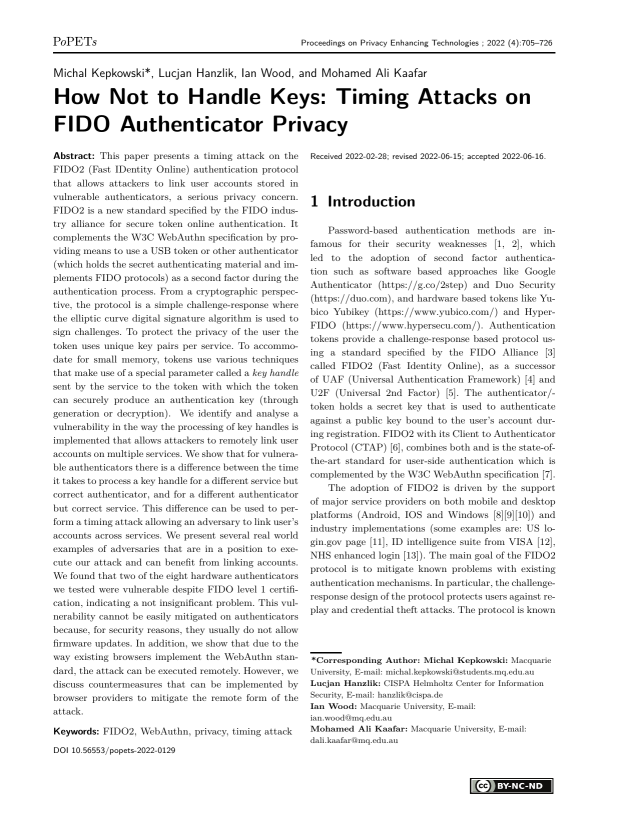How Not to Handle Keys: Timing Attacks on FIDO Authenticator Privacy
Authors: Michal Kepkowski (Macquarie University), Lucjan Hanzlik (CISPA Helmholtz Center for Information Security), Ian Wood (Macquarie University), Mohamed Ali Kaafar (Macquarie University)
Volume: 2022
Issue: 4
Pages: 705–726
DOI: https://doi.org/10.56553/popets-2022-0129
Abstract: This paper presents a timing attack on the FIDO2 (Fast IDentity Online) authentication protocol that allows attackers to link user accounts stored in vulnerable authenticators, a serious privacy concern. FIDO2 is a new standard specified by the FIDO industry alliance for secure token online authentication. It complements the W3C WebAuthn specification by providing means to use a USB token or other authenticator (which holds the secret authenticating material and implements FIDO protocols) as a second factor during the authentication process. From a cryptographic perspective, the protocol is a simple challenge-response where the elliptic curve digital signature algorithm is used to sign challenges. To protect the privacy of the user the token uses unique key pairs per service. To accommodate for small memory, tokens use various techniques that make use of a special parameter called a key handle sent by the service to the token with which the token can securely produce an authentication key (through generation or decryption). We identify and analyse a vulnerability in the way the processing of key handles is implemented that allows attackers to remotely link user accounts on multiple services. We show that for vulnerable authenticators there is a difference between the time it takes to process a key handle for a different service but correct authenticator, and for a different authenticator but correct service. This difference can be used to perform a timing attack allowing an adversary to link user’s accounts across services. We present several real world examples of adversaries that are in a position to execute our attack and can benefit from linking accounts. We found that two of the eight hardware authenticators we tested were vulnerable despite FIDO level 1 certification, indicating a not insignificant problem. This vulnerability cannot be easily mitigated on authenticators because, for security reasons, they usually do not allow firmware updates. In addition, we show that due to the way existing browsers implement the WebAuthn standard, the attack can be executed remotely. However, we discuss countermeasures that can be implemented by browser providers to mitigate the remote form of the attack.
Keywords: FIDO2, WebAuthn, privacy, timing attack
Copyright in PoPETs articles are held by their authors. This article is published under a Creative Commons Attribution-NonCommercial-NoDerivs 3.0 license.

